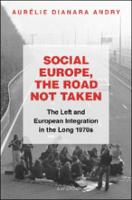Social Europe, the Road not Taken
The Left and European Integration in the Long 1970s
Abstract
This book examines the European Left’s attempt to think and give shape to an alternative type of European integration—a ‘social Europe’—during the long 1970s. Based on fresh archival research, it shows that the western European Left—in particular, social democratic parties, trade unions, and to a lesser extent ‘Eurocommunist’ parties—formulated a broad project to turn ‘capitalist Europe’ into a ‘workers’ Europe’. This alternative model of European unity favoured coordinated measures for wealth redistribution, market regulation, a democratization of the economy and of European institutions, upward harmonization of social and fiscal systems, more inclusive welfare regimes, guaranteed employment, economic and social planning with greater consideration for the environment, increased public spending to meet collective needs, greater control of capital flows and multinational corporations, a reduction in working time, and a fairer international economic order favouring the global South. During the pivotal years following 1968, deeply marked by labour militancy, new social movements, economic crisis, and the unmaking of the ‘postwar compromise’, a window of opportunity opened in which European integration could have taken different roads. The defeat of ‘social Europe’ was a result of a decade-long social conflict which ended with the affirmation of a neoliberal Europe. Investigating this forgotten power struggle and the reasons of its defeat can be useful not just to scholars and students eager to understand the historical evolution of European integration, the European Left, and European capitalism, but also to anyone interested in building alternative European and global futures.
Keywords
social Europe, workers’ Europe, neoliberalism, European integration, 1970s, European Left, social democracy, trade unionDOI
10.1093/oso/9780192867094.001.0001ISBN
9780192867094Publisher
Oxford University PressPublisher website
https://global.oup.com/Publication date and place
Oxford, 2022Grantor
Classification
European history
History and Archaeology
Later 20th century c 1950 to c 1999
Pages
333Metrics
Measures
Timeline
Geographical
Information


 Download
Download Web Shop
Web Shop